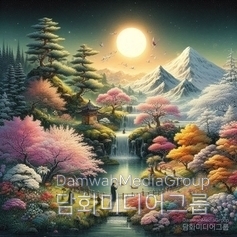By UN Journal Lee Jon-young
湖月撈影 湖月撈影 "Trying to catch the moon in the lake."
湖水無塵映月明 "The lake is clear without dust, shining brightly in the moonlight"
輕波一掬碎光生 ""When the calm waves rise, a shattered light is seen."
虛浮難取縈手裏 "A floating shadow is hard to catch, and it drifts in my hand."
空勞夢影滿江聲 "Empty labor is all that remains, and the river is filled with the shadows of dreams."

This poem expresses a sense of vain desire and futility through the contents, "I try to catch the moon reflected in the lake, but I can't."
The lake is clear, and the moonlight is clear. But the object of desire is only beautiful and attractive, but it has no substance.
I try to scoop up the water with my hands, but the moonlight breaks and scatters. When I try to catch it, it disappears.
The moon's shadow is inherently ungraspable. Desire is like an illusion that cannot be fulfilled from the start.
In the end, only futile efforts remain, and the moon's shadow is still floating on the river. There is nothing to be gained by vain greed.
The poem conveys the realization that "trying to grasp the ungraspable leaves only futile efforts," which resonates with the Buddhist teaching of impermanence無常, that everything changes and is not worth clinging to.




